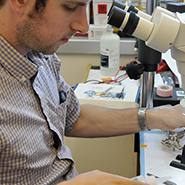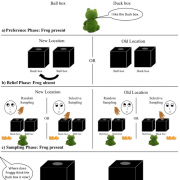Infants expect agents to act rationally in pursuit of their goals. However, little research has considered whether children expect other agents to learn rationally. In this project, we are investigating 4.5- to 6-year-olds’ reasoning about another agent’s beliefs after the agent observes a sample drawn randomly or selectively from a population. Do children who can correctly track both the true state of the world and the other agent’s initial beliefs expect the agent to learn rationally by updating his prior beliefs only when warranted by the evidence? This work allows us to ask whether the ability to integrate these factors underlies an understanding of how evidence informs others’ beliefs.
Development of Intelligence
 Understanding the development of intelligence in a human infant is a key project of CBMM. This project engages the fundamental tradeoff between nature and nurture, or priors and data, and ultimately the origin of priors—how constraints are selected by evolution, encoded in genes, and instantiated in genetically wired brain circuits.
Understanding the development of intelligence in a human infant is a key project of CBMM. This project engages the fundamental tradeoff between nature and nurture, or priors and data, and ultimately the origin of priors—how constraints are selected by evolution, encoded in genes, and instantiated in genetically wired brain circuits.
This project also represents a novel developmental approach to building human-like artificial intelligence systems and comprehensive computational models of human cognitive architecture. Instead of branching out from a single area of adult human intelligence, we start with an integrated cognitive model of multiple core capacities in the young child’s mind, along with a set of developmental or learning mechanisms for scaling up to an adult model.

